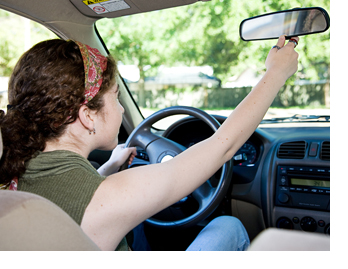
Shoulder to the Wheel: Parental Intervention Improves Teen Driving
January 14, 2015—Motor vehicle accidents are the leading cause of teenage death in America. According to the Centers for Disease Control and Prevention, seven 16- to 19-year-olds die every day as a result of injuries incurred from road crashes. But attempts to address the problem through legislation and technological innovation have yielded limited results.
Now a new study by Tel Aviv University researchers proposes a two-pronged strategy of vigilant parental intervention and monitoring technology to improve the safety of young drivers on the road. The research, published recently in the Journal of Adolescence, was led by Professor Haim Omer of TAU's School of Psychological Sciences and conducted by Dr. Yaara Shimshoni, in collaboration with Or Yarok of the Association for Safer Driving in Israel.
"We have shown that it is possible to reduce dangerous driving in young drivers by increasing parental involvement in a positive way," Omer said. "Our program is based on a model of parental involvement called 'Vigilant Care,' shown to be effective in reducing risky behavior exhibited in other fields. According to this model, parents remain non-invasively involved in their youngsters' activities, but are poised to increase their level of involvement at the first signs of danger."
"Vigilant Care," emphasizing both parental intervention to reduce risky behavior as well as a nurturing environment in which to introduce the involvement, lies at the heart of the model of parental guidance. Prior to the study, some parents received training in Omer's program.
Learning from feedback
For the study, 242 families of adolescent drivers installed In-Vehicle Data Recorders (IVDRs) that monitor driving in real time and offer feedback on risk patterns in the cars. The families were then assigned to one of four groups that differed according to type of IVDR feedback and level of parental intervention: 1) IVDR feedback to the entire family that led to parental intervention through their "Vigilant Care" training; 2) IVDR feedback to the entire family that did not lead to parental intervention; 3) individual IVDR feedback without parental guidance; and 4) neither IVDR feedback nor parental involvement.
For example, a young driver would be required to send a text message to his parents upon arriving at his destination and once again before midnight. In this way, the parents were certain to remain on their son's mind, one of the protective mechanisms at the heart of "Vigilant Care." The parents would also hold "driving chats" with their son on a weekly basis, sitting together to plan trips to new destinations. In these ways, the novice driver was constantly reminded of his parents while driving. As one of the teens said, "I felt as though someone was sitting by my side, even though I was alone in the car."
From pre-teens to teens
"In past studies, 'Vigilant Care' has been shown to reduce risky behavior in many areas of child development," said Omer. "However, the difficult challenge here was to amend and apply the model to an older and normative population of young adults."
After following the teen drivers and the four groups for three months at a time, the researchers found that the drivers whose parents had received "Vigilant Care" training and who had also received family-wide IVDR feedback significantly improved their behavior behind the wheel. The combined technological monitoring plus intervention was found to be most effective for drivers who exhibited the riskiest behavior.
"We have shown that the combination of technology and 'Vigilant Care' can meet the challenge of dangerous teen driving," said Shimshoni. "This is the first study in which a systematic, theory-based intervention for parental involvement in teen driving was found to be effective."
Omer, together with Or Yarok, is currently adapting and extending the "Vigilant Care" intervention to address the needs of different populations.
GEORGE HUNKA
ARTICLE:
“Effects of parental vigilant care and feedback on novice driver risk,” Yaara Shimshoni, Haneen Farah, Tsippy Lotan, Einat Grimberg, Oren Dritter, Oren Musicant, Tomer Toledo, Haim Omer. Journal of Adolescence, Volume 38, January 2015, Pages 69-80
